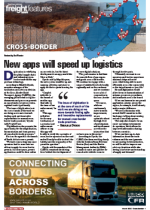Growing and stable economies across the region are driving up cross-border cargo volumes.According to Karel-Jan Nothnagel, owner of Afrigo Global Logistics, increasing volumes can be seen across various cargo sectors. “We attribute this to the somewhat stable economies we see in countries such as Angola and Namibia. Sectors where we are seeing particular volume growth include the mining, oil and gas and construction.”Several economies in Africa are also again showing positive growth after being hit hard by the Covid-19 pandemic, boding well for the cross-border sector in the long run.Cross-border volumes also stand to benefit from the African Continental Free Trade Agreement (AfCFTA).But, said Nothnagel, with limited supply chain solutions available, customers were increasingly requiring more speedy and reliable cross-border solutions from service providers.“In addition to our dedicated road service to Angola, we introduced a consolidated road service that has grown steadily since its inception in 2020,” he said. “Limited operators are offering this service. We have worked hard to deliver customer service that can differentiate us from our competitors.”Nothnagel said the cross-border sector was not always an easy space to operate in. “Border clearances can present a challenge,” he explained, saying this was largely overcome by prohibiting third-party clearances for their consolidated road products and strictly controlling the clearance process themselves. “At times this may be challenging for customers to understand or accept. We do, however, need to consider the greater impact on all cargo interests. Overall, this approach has proven to be successful and has allowed us to maintain the integrity of the service.”He said an ongoing challenge was the poor road infrastructure. “It is therefore important that we retain drivers who are skilled and experienced in navigating these conditions ensuring safe delivery of cargo”

